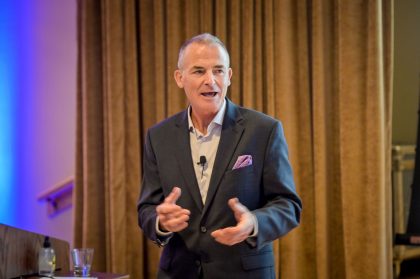Death of a Public Speaker

The business of public speaking is a strange one. There’s no real “product” - not much to measure – and nothing you can put in a box or weigh in your hands. Just you talking.
Your client wants to make the “perfect” decision and will often run you through a gauntlet of interviews and conference calls, ask about deliverables, and want to see references. Yet, despite all the scrutiny, few bother to measure results.
Some events are booked months in advance. Some are last minute. And months can go by without a pay check. The nagging fear of a blank calendar leads to some less-than-ideal contracts that make you envy people with ‘real’ jobs and a pension.
Despite all that, I’ve done well at the game.
Early on, I learned there was a bigger opportunity in corporate training and I jumped in, building a team of enthusiastic trainers, office support, and coaches. Contracts got larger, clients gave us repeat business, and over the years I squirreled money away.
Now I’m done with the game - 27 years chasing contracts, late-night preparation, and racing to catch flights - all the while trying to impress audiences. I quit.But, I’m getting ahead of myself.
Getting standing ovations
I didn’t plan to be a public speaker. I wasn’t even aware it could be a ‘business.’ As I remember, a casual invitation led to me leading a weekend workshop on marketing and the kick-off to my speaking career.
Since then, I’ve presented in every imaginal type of venue – from the back room of churches to sold-out ballrooms. I’ve been put up in the nicest hotels. I’ve also spent more nights than I care to remember staring at peeling paint on motel ceilings in rooms that reeked of cigarettes.
I’ve received standing ovations followed by a lineup of people wanting to buy my book. And on (thankfully) rare occasions I’ve been a complete mismatch for what the audience wanted. And it was obvious.
Now that I’m long-in-the-tooth, I get asked for advice about the speaking business. How do I find an audience? (go to a conference, look in the ballroom). What should I charge? (until you’ve done 100 speeches, your fees are not the problem.) Should I have a website (really?)Through all the late nights, airport lobbies, nervous preparation, and rewriting material (that didn’t improve with the rewriting), I’ve learned a few things about success in this crazy business.
As an inveterate teacher, I, of course, made a list.
Lessons from the long road
This is not a long list, but that’s sort of the point. Long lists tend to include minutia (like: should I have a cancelation policy?) that distract from what makes a million-dollar speaker from someone who needs a part-time (real) job to get by. That’s why I’m only offering 7 tips—a short list that might take many years to fully embrace. Here goes:
Prepare more than you have to. The best speakers know their subject so deeply they can choose the 10% of the iceberg we get to enjoy (they also love their metaphors.)
Don’t deliver it all. The late Tony Bennett advised that you should never deliver all your best stuff. That way you get hired back. Good advice.
Plan down-time. One more hour of sleep is more valuable than two hours of late-night, frantic preparation.
Less PowerPoint. Instead of spending precious hours building slides, get to know your material better. People came for you, not your slides.
Teach with stories. If you can’t tell a great story or be funny you shouldn’t be presenting (unless you’re an economist, of course.)
You are your marketing. Getting likes on Instagram is neat, but ultimately your best marketing is your last speech. Make it count.
Be real. Before you get on stage, meet people, remember names, ask questions, and create connections. They will love you for it.
Most importantly, strive to create magic.
A certain unmeasurable magic
There’s a certain unmeasurable magic that can happen with any audience. It’s a moment when stage techniques are unnecessary – even unwanted – and everything becomes easy.
It’s not easy, of course – it might have taken you 5 or 10 years to get to this point – but when it happens, you’re no longer ‘working the audience’. This is the most memorable part of your delivery. The moment when the timing and message are so right, so personal, we lean in. We allow that perfectly delivered lesson to carve a neural pathway to be retrieved later, just when we need it.
This is what they remember – even share with friends and co-workers. It might be the only part of the 60-minute-long speech they remember. But it’s a good one.That’s what I crave—creating those moments. I don’t want to schlep my roll-on halfway across the country just to get a laugh. I want more.
So I quit being a “speaker.”
This might not make any sense
If you are new to presenting, this might not make any sense. In fact, your goal should be to get on the road and earn those first 100 speeches. Experience will be your best teacher. But, if you’ve ever experienced the magic – the synchronicity – between you and your audience, then you know what I’m talking about.
I want more moments like that – less trying to ‘teach’ – more allowing the moment to happen. I have more speeches in me. More audiences—more connections, and more opportunities to serve. That’s what I want for you as well.
Enjoyed this article? Here are some of my most popular articles about the speaking business:
The one secret about public speaking nobody will tell you
Small Wins - Why Little Steps are the Path to Big Rewards
Keynotes and workshops by Hugh Culver


